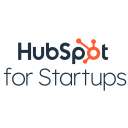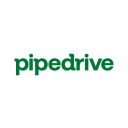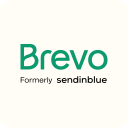HubSpot vs Marketo: How to choose the right tool for your business
- 01HubSpot vs Marketo: overview
- 02What's the difference between HubSpot and Marketo?
- 03HubSpot pros and cons
- 04Marketo pros and cons
- 05HubSpot compared to Marketo
- 06Marketo compared to HubSpot
- 07Features comparison
- 08HubSpot vs Marketo: Which is the best for your business?
- 09Promotions on Prospecting software
- 10Alternatives to HubSpot & Marketo
Save up to $7,000 on HubSpot
HubSpot
75% off for 1 year
Save up to $7,000 on HubSpot
HubSpot
75% off for 1 year
Businesses in both the B2B and B2C industries need to have proper processes in place to support their sales and marketing, like CRM, lead management and evaluation, email and social media marketing, and analytics. Without these processes, it’s near impossible to grow your business.
That’s where marketing automation software comes in. Two solutions on the market are HubSpot and Adobe’s Marketo Engage. This article puts these tools head-to-head, taking a closer look at their key features, differences, and examples of how different businesses use them. Armed with this information, you can weigh up whether HubSpot or Marketo is better for your business.
HubSpot vs Marketo: overview
HubSpot and Marketo are well-established players in the realm of marketing automation and customer engagement. With a plethora of features and tools offered by both platforms, determining which one reigns supreme in the HubSpot vs Marketo matchup can be a challenging task.
To aid you in making an informed decision for your business, we've prepared a comprehensive comparison table highlighting the key attributes of each marketing automation platform. Each criterion is evaluated using a star-based rating system, complemented by insightful commentary, to facilitate your assessment of the table below.
What's the difference between HubSpot and Marketo?
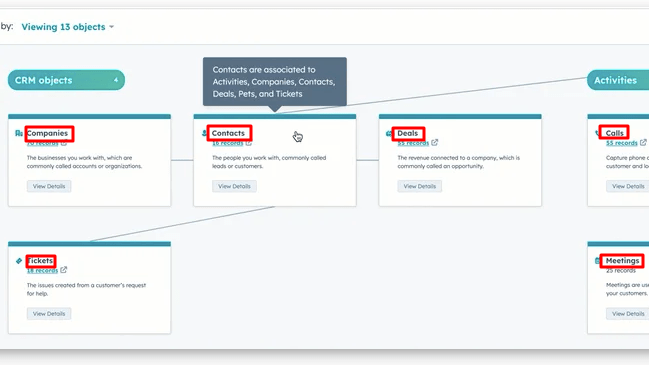
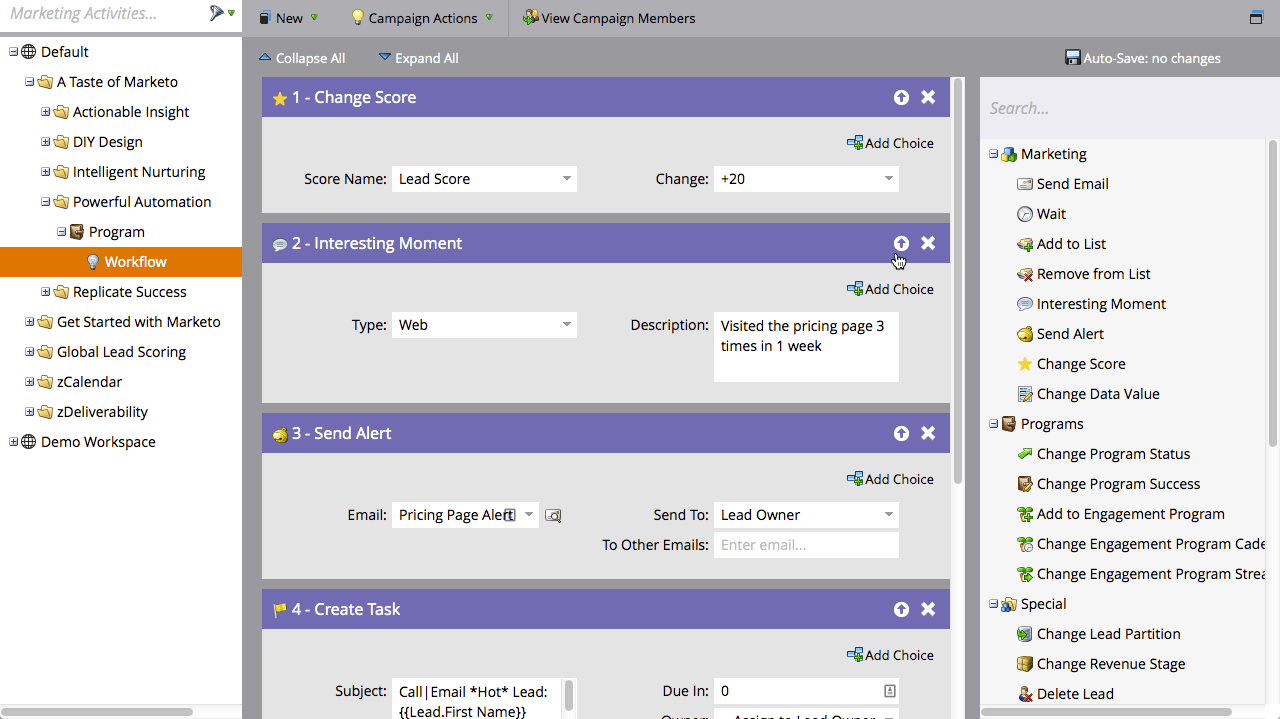
HubSpot and Marketo are popular marketing automation solutions, offering tools to automize and enhance your digital marketing efforts. While they share many features—including lead management, email marketing, social media marketing, landing pages, and analytics—some specific differences may guide your choice as to which tool best fits your business needs.
One of the key differences is in their approach to CRM functionality. While HubSpot offers a built-in CRM, Marketo integrates with third-party CRMs like Salesforce. HubSpot’s CRM fully integrates with its other feature hubs, including marketing and sales. This makes HubSpot an excellent tool for centralizing and sharing information between your sales, marketing, and customer support teams. As Marketo integrates with third-party CRMs, it requires more configuration than HubSpot. In saying that, Marketo remains a powerful marketing automation platform focusing on features like lead management and complex nurturing workflows. If you already use a CRM you like, Marketo may be your pick.
Another difference between HubSpot and Marketo is their scalability. Designed to handle large volumes of contacts and leads, Marketo offers tremendous scalability and a high level of customization, allowing you to target a wide range of audiences.
A final difference to note between the two tools is their pricing strategies. HubSpot has a slightly complex yet transparent pricing structure. The cost of its paid plans increases according to usage, with higher subscriptions providing more generous contact and email send limits. The range of subscriptions—including a free version—likely suits both small and large businesses. Compared to HubSpot, Marketo’s pricing isn’t publicly available. It offers four subscription tiers—Select, Prime, Ultimate, and Enterprise. Interested users need to contact the platform for a customized quote. The cost of Marketo subscriptions depends on factors including the number of users, the size of your marketing database, and the required features.
30% off Professional and Enterprise plans for 1 year across all Hubspot products on HubSpot
Get 30% off Professional and Enterprise plans for 1 year across all Hubspot products on HubSpot and up to $2,000 savings with Secret.
HubSpot pros and cons
What are the advantages of HubSpot?
- All-in-one platform: HubSpot offers a comprehensive suite of tools for marketing, sales, and customer service, allowing businesses to manage multiple aspects of their operations within a single platform.
- User-friendly interface: HubSpot's intuitive interface and user-friendly design make it accessible for users of varying technical expertise to create and manage campaigns, track analytics, and automate processes.
- Robust reporting and analytics: HubSpot provides powerful reporting and analytics features, enabling businesses to track the performance of their marketing efforts and make data-driven decisions.
- HubSpot Academy: The HubSpot Academy offers a wealth of educational resources, including courses and certifications, to help users enhance their marketing and sales skills and make the most of the platform.
- Customization and scalability: HubSpot offers flexibility and scalability, allowing businesses to tailor their strategies and campaigns to their specific needs and grow their operations as they expand.
What are the disadvantages of HubSpot?
- Costly for small businesses: HubSpot's pricing plans can be relatively expensive, making it less accessible for small businesses or startups with limited budgets.
- Learning curve: While HubSpot is user-friendly, its extensive range of features and tools may still require some learning and training, particularly for new users.
- Limited advanced features: In comparison to some specialized tools, HubSpot's more advanced features may not be as extensive or tailored to specific niche requirements.
- Integration complexity: While HubSpot does offer integrations, integrating with certain third-party applications may require additional configuration or development work.
- Platform dependency: Businesses that heavily rely on HubSpot may find it challenging to migrate away from the platform due to the integration of various operations within it.
Compare HubSpot to other tools
Marketo pros and cons
What are the advantages of Marketo?
- Advanced marketing automation: Marketo offers robust marketing automation capabilities, allowing businesses to automate and streamline their marketing campaigns, lead nurturing, and customer engagement.
- Scalability: Marketo is suitable for businesses of all sizes, from small startups to large enterprises, offering the flexibility to scale marketing efforts as the business grows.
- Personalization and segmentation: Marketo enables sophisticated audience segmentation and personalized marketing campaigns, helping businesses deliver targeted messages to specific customer segments.
- Integration and ecosystem: Marketo offers a wide range of integrations with other marketing, sales, and CRM tools, allowing businesses to create a tailored marketing technology stack.
- Powerful analytics and reporting: Marketo provides in-depth analytics and reporting features, enabling businesses to track and measure the performance of their marketing activities and optimize their strategies.
What are the disadvantages of Marketo?
- Complex implementation: Setting up and configuring Marketo can be complex and may require technical expertise, potentially leading to a longer implementation process.
- Learning curve: Marketo's advanced features and capabilities can result in a steep learning curve for new users, necessitating training and familiarization.
- Costly: Marketo's pricing can be relatively high, especially for small businesses or those with limited marketing budgets, making it less accessible for certain companies.
- Customization challenges: While Marketo offers extensive capabilities, highly customized marketing workflows or unique use cases may require additional development or customization.
- Dependency on IT: Some tasks within Marketo, such as complex integrations or technical configurations, may require involvement from IT teams, potentially causing delays or dependencies.
HubSpot compared to Marketo
In our assessment of HubSpot and Marketo platforms, we discover that HubSpot offers distinct advantages, including user-friendliness, more cost-effective pricing, and comprehensive automation solutions tailored to simplify team workflows.
Opting for HubSpot, a versatile SaaS solution, can efficiently centralize your customer relationship management efforts. This facilitates the implementation of a comprehensive customer engagement strategy, even though HubSpot may offer fewer advanced functionalities compared to its counterpart, Marketo, which is recognized as an industry leader with more intricate features.
Is HubSpot better than Marketo?
The question of whether HubSpot is better than Marketo lacks a one-size-fits-all answer. It hinges on individual business needs. HubSpot excels with its user-friendly interface and integrated suite of marketing, sales, and customer service tools. Its free version appeals to startups and small businesses, making it a cost-effective choice.
In contrast, Marketo's scalability and advanced features shine in larger enterprises. Its seamless CRM integration ensures robust marketing and sales alignment. The verdict ultimately depends on factors like company size, complexity of marketing needs, and budget. A careful evaluation of both platforms in light of specific requirements is crucial for making the right choice.
What is HubSpot best used for?
HubSpot thrives as a versatile hub for inbound marketing endeavors. Its expansive toolkit encompasses content creation, SEO optimization, social media orchestration, email campaign orchestration, lead nurturing campaigns, and performance analytics.
Catering particularly to the needs of small to mid-sized enterprises, HubSpot offers a seamless avenue for attracting, engaging, and converting leads through the intricate tapestry of inbound marketing techniques. Its streamlined interface and intuitive design complement its role as a go-to platform for driving growth through strategic inbound initiatives.
Can HubSpot replace Marketo?
While HubSpot and Marketo share a multitude of similar features, it's important to recognize their distinct niches. HubSpot, often preferred by smaller to mid-sized businesses, focuses on inbound marketing, making it an apt choice for resource-conscious enterprises aiming to optimize their online presence.
Marketo, on the other hand, caters to larger corporations and enterprises seeking sophisticated marketing automation tailored to intricate buyer journeys. While these platforms exhibit overlaps, a wholesale replacement is contingent upon whether your business aligns more closely with the capabilities of HubSpot or Marketo.
Is HubSpot cheaper than Marketo?
When it comes to pricing, HubSpot boasts a spectrum of plans tailored to different budgetary scales and operational requirements. The transparency in HubSpot’s pricing structure, offering both free and paid plans, enhances its appeal to businesses of various sizes.
On the flip side, Marketo tends to exhibit a steeper cost, particularly for enterprises necessitating elaborate marketing automation and larger-scale operations. The relative affordability of HubSpot may emerge as a decisive factor, but the final cost-effectiveness comparison depends on the specific needs and growth trajectories of your enterprise.
Is there a better Prospecting software than HubSpot?
While HubSpot has gained recognition for its prowess in marketing automation, it's essential to consider alternative options that could potentially align more closely with your specific needs.
Marketo, Mailchimp, Salesforce Marketing Cloud Account Engagement and Act-On emerge as noteworthy alternatives to HubSpot, each boasting distinct capabilities. By evaluating their features, pricing structures, and how well they align with your business goals, you can confidently determine the ideal marketing automation solution. This in-depth exploration ensures that your decision is well-informed, enabling your business to harness the power of automation to achieve heightened efficiency and attain greater success in your endeavors.
75% off for 1 year on HubSpot
Get 75% off for 1 year on HubSpot and up to $7,000 savings with Secret.
Marketo compared to HubSpot
In our comparison of Marketo and HubSpot platforms, we observe that Marketo offers distinct benefits, including advanced automation capabilities, comprehensive analytics, and robust integration options to enhance your marketing endeavors. This powerful SaaS solution is well-suited for businesses aiming to optimize their marketing campaigns and drive results.
By choosing Marketo, you can streamline your marketing activities and centralize your efforts, enabling the implementation of a comprehensive strategy to engage and nurture leads. It's worth noting that while Marketo excels in offering advanced features, HubSpot, while offering a more user-friendly experience, may have a more simplified feature set in comparison.
Is Marketo better than HubSpot?
The question of whether Marketo is better than HubSpot depends on the specific needs and goals of your business. Marketo is a powerful marketing automation platform that excels in managing complex B2B marketing processes and intricate buyer journeys. It offers advanced features tailored for enterprises with sophisticated marketing needs.
Ultimately, the better choice between Marketo and HubSpot will depend on factors such as the size of your business, your target audience, the level of personalization required, and the scope of functionalities needed for your marketing efforts.
What is Marketo best used for?
The optimal utilization of Marketo shines in intricate B2B marketing landscapes that demand precision in lead scoring, meticulous nurturing strategies, and in-depth analytics. Its robust capabilities make it an invaluable asset for large enterprises that engage in multi-layered buyer journeys, ensuring that every touchpoint is strategically addressed.
For instance, a global software corporation leveraging Marketo could fine-tune lead scoring to prioritize prospects showing high intent, while employing automated nurturing workflows to guide them through a complex decision-making process.
The platform's scalability and advanced features become even more advantageous for tech-savvy teams orchestrating elaborate marketing campaigns across various regions and market segments.
Can Marketo replace HubSpot?
While Marketo boasts advanced lead management and excels in B2B strategies, it may not entirely supplant HubSpot's role for enterprises prioritizing a seamless blend of content marketing, sales, and customer service. For instance, a growing e-commerce company could find HubSpot more suitable due to its intuitive interface, enabling effective management of product promotions, sales tracking, and customer support inquiries all in one platform.
Marketo's strengths lie in orchestrating complex lead nurturing campaigns and intricate buyer journey management, making it indispensable for a software firm aiming to engage high-level decision-makers in a long sales cycle.
Is Marketo cheaper than HubSpot?
When evaluating costs, Marketo often emerges as the more expensive option in comparison to HubSpot. Marketo’s pricing model is customized, with specific details revealed post-consultation. This can pose challenges for smaller businesses aiming to efficiently allocate their budget.
In contrast, HubSpot's advantage lies in its transparent and tiered pricing structure, offering diverse plans to cater to various business scales and requirements. A startup seeking marketing automation with budget constraints might find HubSpot's accessible pricing tiers, which encompass a range of features, more suitable for their financial planning and growth trajectory.
Is there a better Marketing Automation software than Marketo?
While Marketo undeniably delivers a robust suite of B2B marketing automation features, it's essential to explore alternatives that might better align with your distinct business needs.
Zoho, HubSpot, Salesforce Marketing Cloud, ActiveCampaign and Hootsuite have all proven to be top alternatives to Marketo’s platform. Finding the "better" marketing automation software requires you to consider factors like industry focus, scalability, and integration potential to pinpoint the optimal solution that propels your marketing endeavors forward.
Features comparison
HubSpot Takes the Lead Over Marketo for User-Friendliness

When evaluating user-friendliness, HubSpot emerges as the frontrunner in comparison to Marketo. HubSpot's interface boasts an intuitive design, making it particularly suitable for marketers who may not have extensive technical expertise, such as startup founders or small business owners venturing into marketing automation.
In contrast, Marketo's interface can appear more intricate, often attracting seasoned marketers adept in navigating complex automation processes. This contrast in usability translates to a smoother onboarding experience with HubSpot, reducing the learning curve and resource investment required.
Therefore, if prioritizing a seamless user experience is pivotal, HubSpot emerges as a more accessible and practical choice among the two platforms.
HubSpot and Marketo Offer Comparable Email Tracking Capabilities
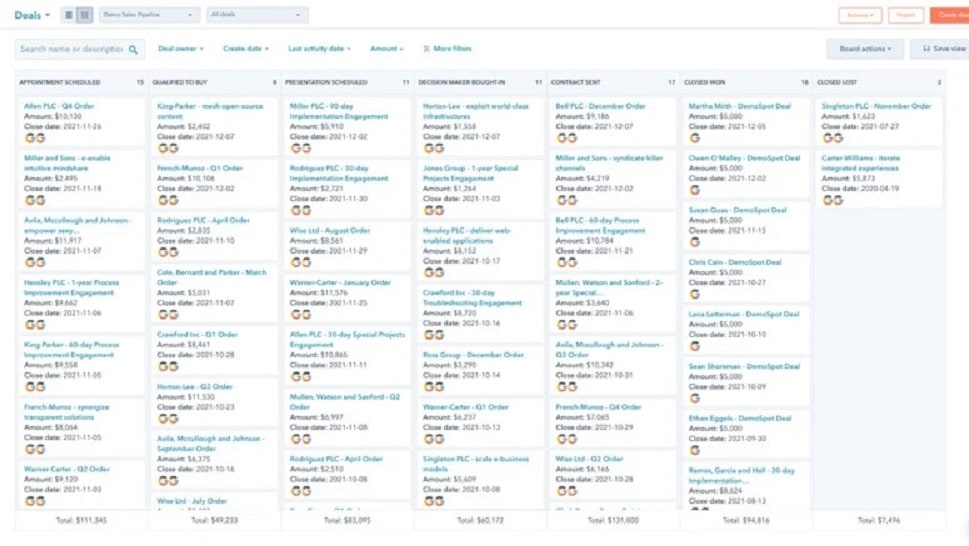
In the world of email tracking capabilities, HubSpot and Marketo emerge as equals, each offering robust features for managing email campaigns.
HubSpot, for instance, empowers users with sales email tracking and customizable templates, enabling the seamless creation and delivery of personalized emails from within the CRM. The real-time notifications further enhance the effectiveness of the email communication process.
Similarly, Marketo also excels in email and campaign management, providing tools to personalize messages across various channels. This alignment in capabilities positions both HubSpot and Marketo on a level playing field, highlighting their dedication to delivering efficient email tracking solutions.
HubSpot has the Advantage Over Marketo with its Wide Array of Integrations
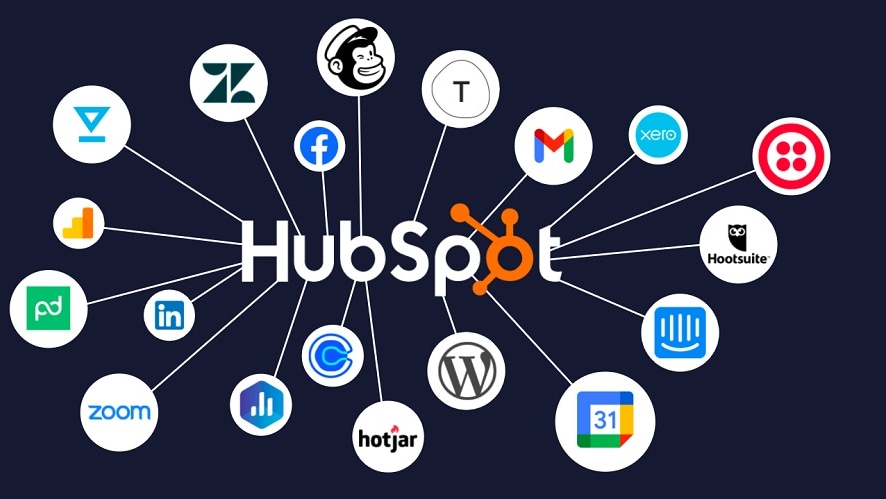
When delving into integration capabilities, HubSpot emerges with a distinct advantage over Marketo, boasting a diverse and extensive array of integrations that seamlessly connect with a wide spectrum of essential business and marketing tools.
HubSpot seamlessly integrates with popular customer relationship management (CRM) systems like Salesforce and provides efficient connectivity with e-commerce platforms such as Shopify. This broad integration spectrum empowers users to streamline workflows and consolidate data from various sources, enhancing overall operational efficiency.
While Marketo also offers integrations, HubSpot's comprehensive compatibility with a multitude of platforms underscores its commitment to providing a holistic and interconnected marketing ecosystem.
HubSpot’s Reporting and Analytics Surpass that of Marketo

When it comes to reporting and analytics, HubSpot truly stands out, showcasing a level of excellence that surpasses that of Marketo. Within the realm of analytics, HubSpot offers a robust suite of tools, complete with a plethora of pre-built dashboards and reports. These resources can be seamlessly tailored to align with your specific business requirements, thereby affording you unparalleled command over your data insights.
While Marketo effectively manages marketing operations, its analytics capabilities may not present the same profound granularity and data manipulation control as those found within HubSpot's reporting framework.
Marketo Excels in Real-Time Personalization Compared to HubSpot
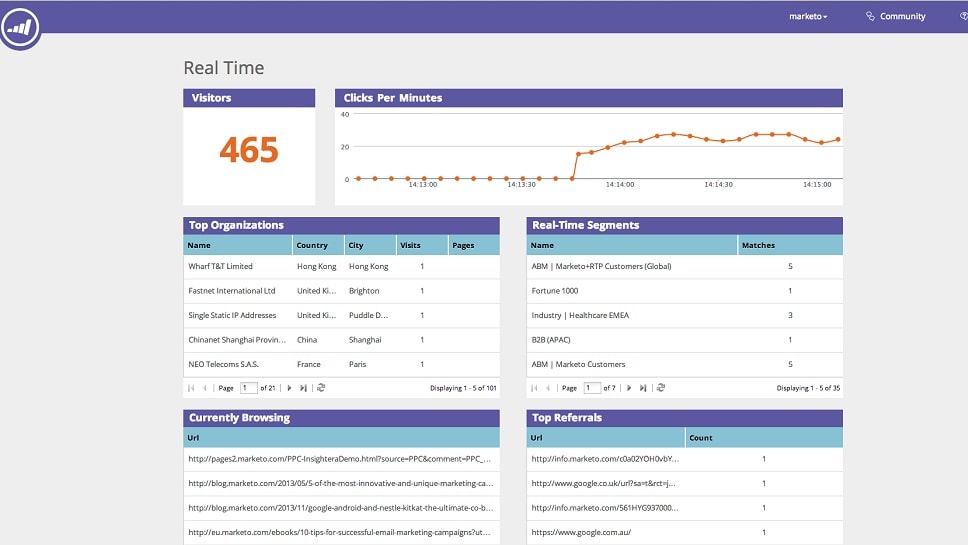
In the arena of personalized customer experiences, Marketo takes the lead with its exceptional real-time personalization capabilities. Marketo empowers businesses to finely tune messages across multiple channels, ensuring a higher degree of relevance and engagement. This allows companies to deliver tailored content and interactions that resonate with individual preferences and behaviors.
While HubSpot offers valuable features like lead scoring and segmentation for identifying and prioritizing leads, its personalized touch isn't as dynamic as Marketo's real-time personalization. This distinction underscores Marketo's prowess in creating more immediate and impactful one-on-one interactions with customers, amplifying the potential for deeper engagement and conversions.
HubSpot Thrives in Sales Pipeline Management While Marketo Lags
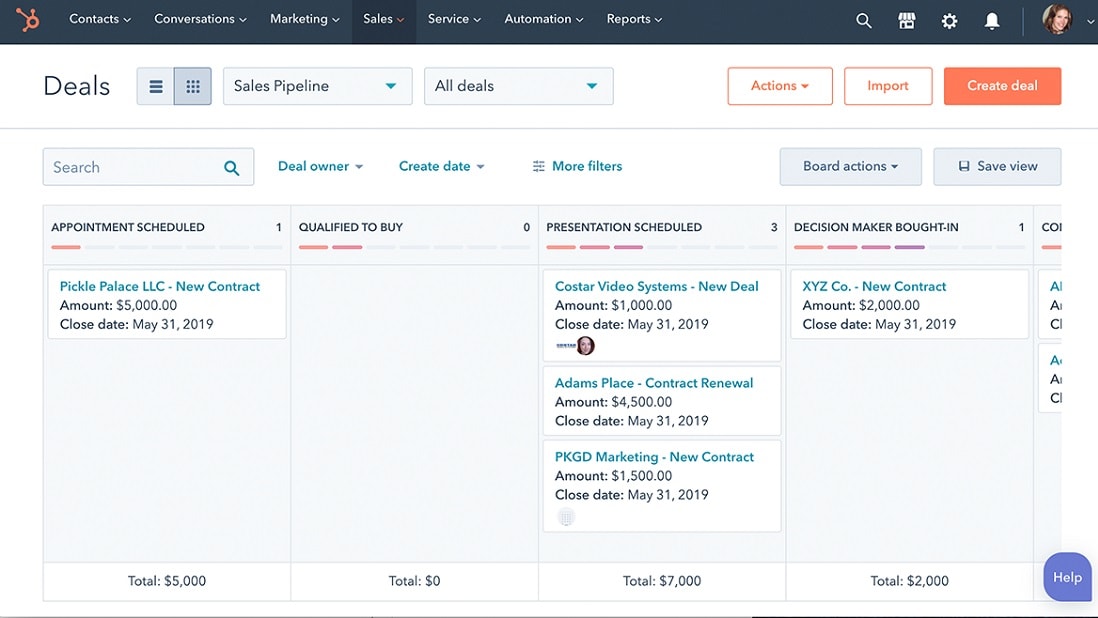
HubSpot shines brightly in the realm of sales pipeline management, providing an intuitive and robust toolset. This feature empowers you to seamlessly track and oversee sales opportunities, offering clear visualization of your sales process and the ability to establish crucial milestones. As a result, your team can efficiently propel deals through the pipeline, streamlining the entire sales cycle.
Marketo falls short in this aspect, lacking a direct equivalent to HubSpot's comprehensive sales pipeline management. This could potentially create hurdles in effective sales tracking and hinder the smooth progression of deals, underscoring HubSpot's advantage in optimizing sales workflows.
HubSpot Outperforms Marketo with Predictive Lead Scoring

HubSpot truly stands out with its advanced predictive lead scoring functionality, a testament to its cutting-edge technology. By harnessing the power of machine learning, HubSpot's predictive lead scoring sifts through historical data and behavioral patterns to pinpoint high-potential leads. This predictive prowess enables businesses to allocate their resources strategically, concentrating on leads that exhibit a higher likelihood of conversion.
While Marketo boasts robust B2B marketing and lead management tools, it lacks the seamless integration of predictive analysis that HubSpot seamlessly incorporates. This disparity underscores HubSpot's superior ability to empower businesses with data-driven insights for more effective lead prioritization and conversion strategies.
Subscribe to our newsletters.
No FOMO here. Stay up-to-date on all the latest deals and news with our monthly newsletter straight to your inbox like 113,000+ entrepreneurs (+ Get 10% off on on our Premium Membership!)
HubSpot vs Marketo: Which is the best for your business?
HubSpot is the best tool for you if:
- You’re looking for an all-in-one marketing solution with a built-in CRM and sales pipeline management to move deals efficiently
- You’re after a tool that offers advanced predictive lead-scoring capabilities to identify high-potential leads
- You’re a small to medium-sized business needing a versatile tool for delivering and managing inbound marketing campaigns
- A solution with a wide range of integrations, including with other CRMs, e-commerce platforms, and social media apps, is your deciding factor
- You have limited technical expertise and prefer a more user-friendly marketing automation solution in exchange for more straightforward features
Marketo is the best tool for you if:
- You already use an existing CRM and are looking for a marketing automation solution to integrate with it
- You’re an enterprise running large-scale marketing campaigns and need a tool that can scale and handle large volumes of contacts and leads
- You need advanced marketing automation to support complex and lengthy buyer journeys as part of B2B marketing campaigns
- Detailed analytics are a priority to optimize your marketing campaigns, nurture leads, and enhance intricate buyer journeys
- You target multiple channels and audiences and require advanced real-time personalization capabilities to tailor content to individual preferences
30% off Professional and Enterprise plans for 1 year across all Hubspot products on HubSpot
Get 30% off Professional and Enterprise plans for 1 year across all Hubspot products on HubSpot and up to $2,000 savings with Secret.
Alternatives to HubSpot & Marketo
Promotions on Prospecting software
Start saving on the best SaaS with Secret.
Secret has already helped tens of thousands of startups save millions on the best SaaS like HubSpot, Marketo & many more. Join Secret now to buy software the smart way.

